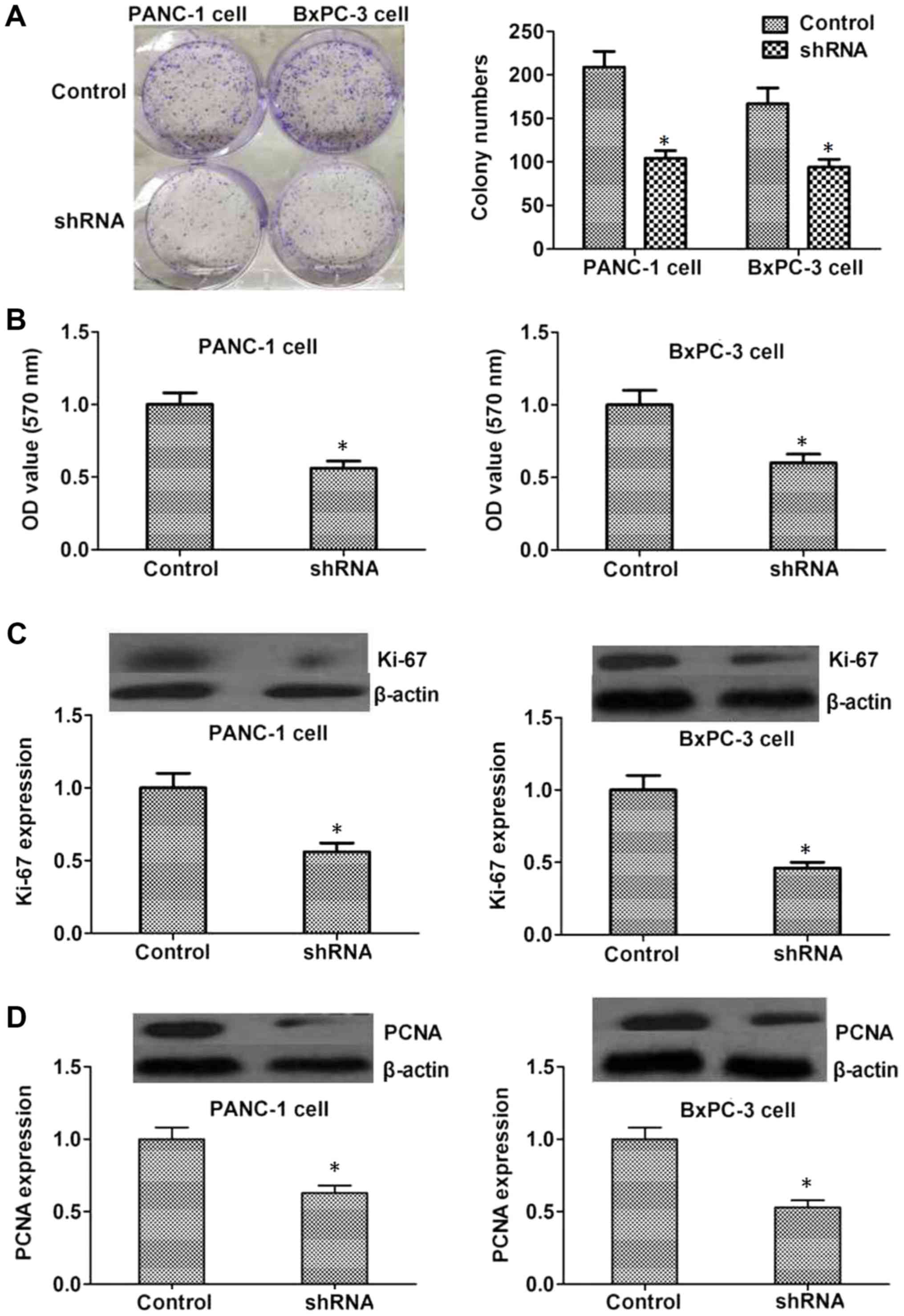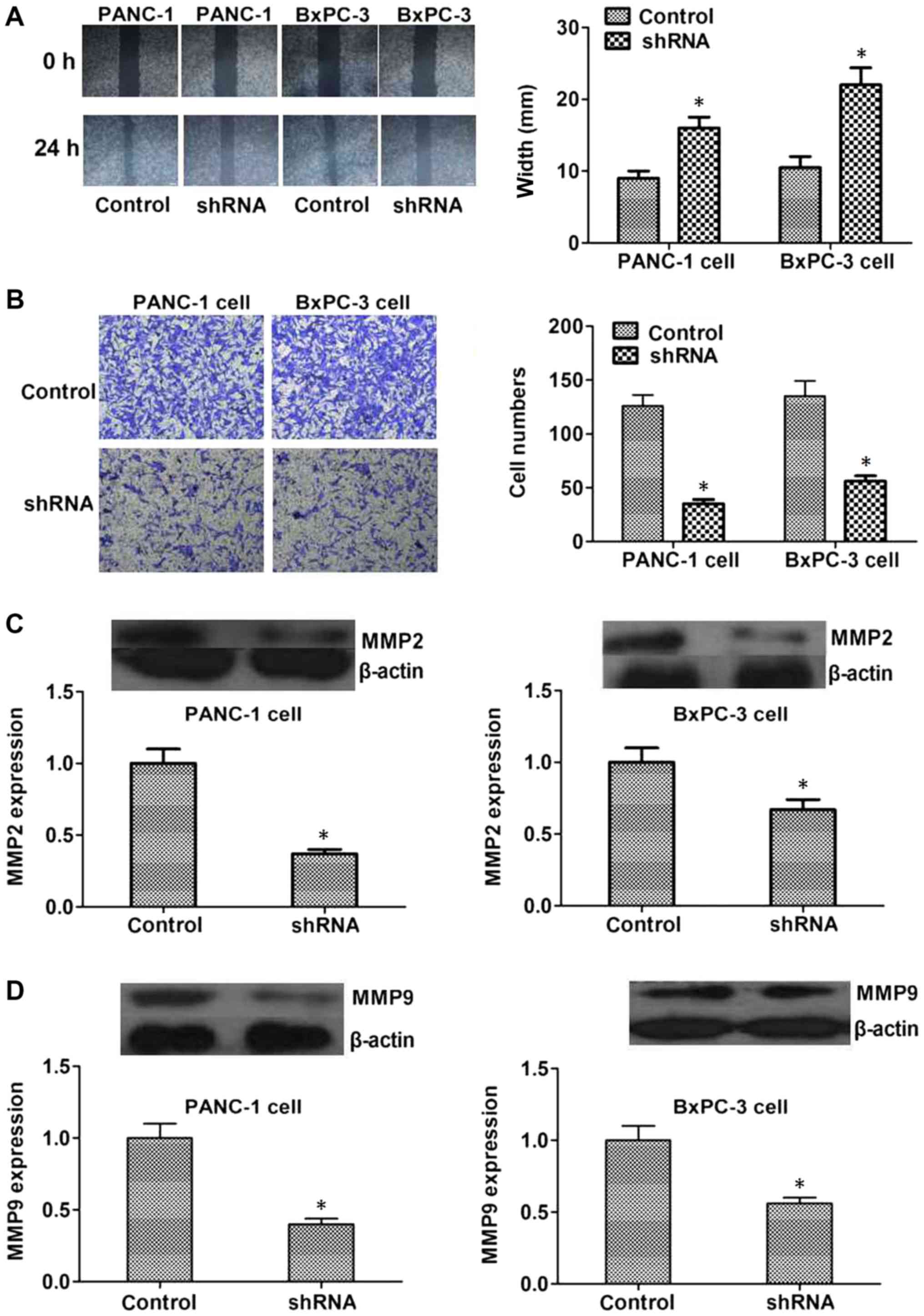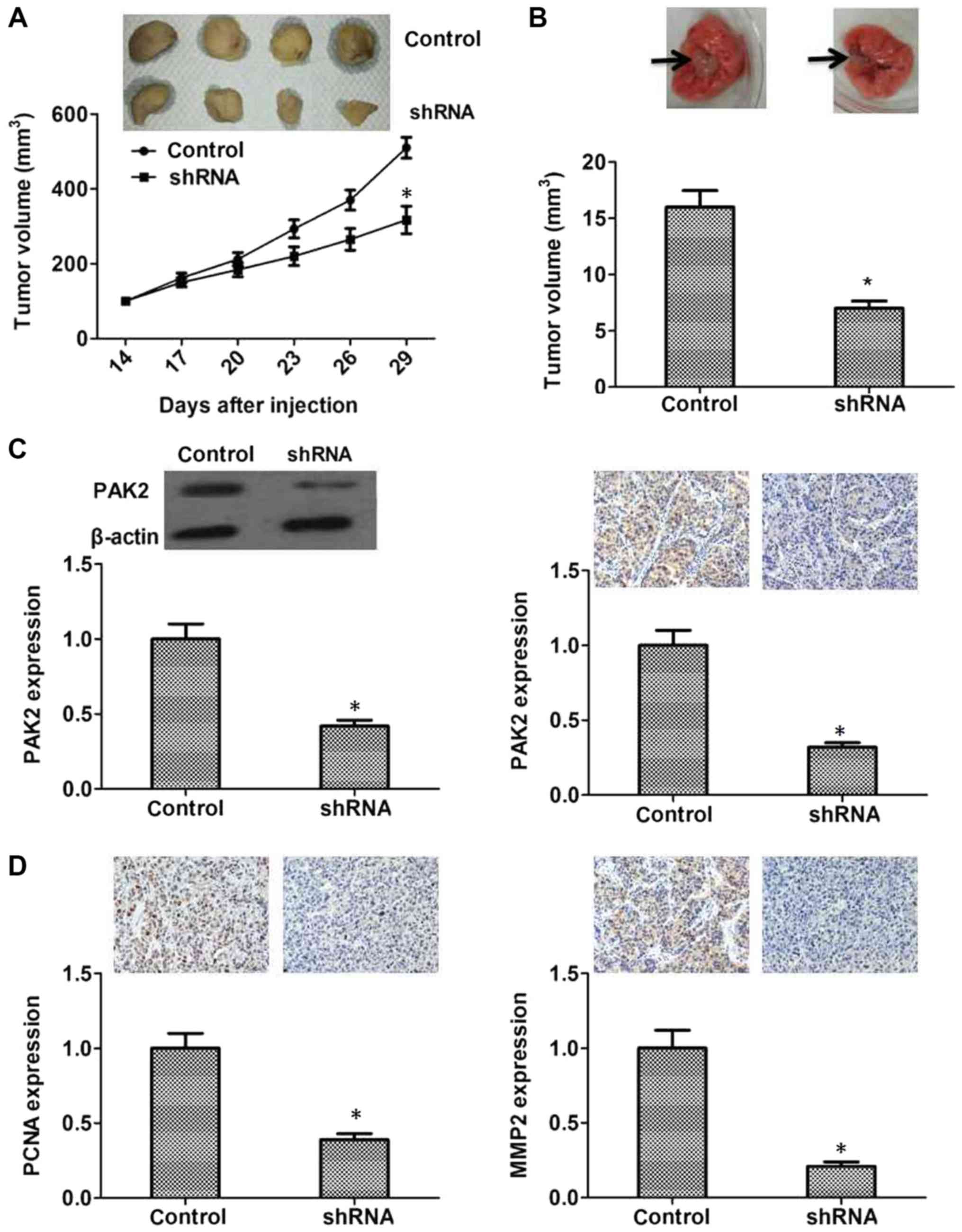|
1
|
Garrido-Laguna I and Hidalgo M: Pancreatic
cancer: From state-of-the-art treatments to promising novel
therapies. Nat Rev Clin Oncol. 12:319–334. 2015. View Article : Google Scholar : PubMed/NCBI
|
|
2
|
Makohon-Moore A, Brosnan JA and
Iacobuzio-Donahue CA: Pancreatic cancer genomics: Insights and
opportunities for clinical translation. Genome Med. 5:262013.
View Article : Google Scholar : PubMed/NCBI
|
|
3
|
Subramani R, Gangwani L, Nandy SB,
Arumugam A, Chattopadhyay M and Lakshmanaswamy R: Emerging roles of
microRNAs in pancreatic cancer diagnosis, therapy and prognosis
(Review). Int J Oncol. 47:1203–1210. 2015. View Article : Google Scholar : PubMed/NCBI
|
|
4
|
Kenner BJ, Go VLW, Chari ST, Goldberg AE
and Rothschild LJ: early detection of pancreatic cancer: The role
of industry in the development of biomarkers. Pancreas.
46:1238–1241. 2017. View Article : Google Scholar : PubMed/NCBI
|
|
5
|
Ko AH: Progress in the treatment of
metastatic pancreatic cancer and the search for next opportunities.
J Clin Oncol. 33:1779–1786. 2015. View Article : Google Scholar : PubMed/NCBI
|
|
6
|
Cicenas J, Kvederaviciute K, Meskinyte I,
Meskinyte-Kausiliene E, Skeberdyte A and Cicenas J: KRAS, TP53,
CDKN2A, SMAD4, BRCA1, and BRCA2 mutations in pancreatic cancer.
Cancers (Basel). 9(pii): E422017. View Article : Google Scholar : PubMed/NCBI
|
|
7
|
Hayashi H, Kohno T, Ueno H, Hiraoka N,
Kondo S, Saito M, Shimada Y, Ichikawa H, Kato M, Shibata T, et al:
Utility of assessing the number of mutated KRAS, CDKN2A, TP53, and
SMAD4 genes using a targeted deep sequencing assay as a prognostic
biomarker for pancreatic cancer. Pancreas. 46:335–340. 2017.
View Article : Google Scholar : PubMed/NCBI
|
|
8
|
Pihlak R, Valle JW and McNamara MG:
Germline mutations in pancreatic cancer and potential new
therapeutic options. Oncotarget. 8:73240–73257. 2017. View Article : Google Scholar : PubMed/NCBI
|
|
9
|
Berger AW, Seufferlein T and Kleger A:
Cystic pancreatic tumors: Diagnostics and new biomarkers. Chirurg.
88:905–912. 2017.(In German). View Article : Google Scholar : PubMed/NCBI
|
|
10
|
Donahue TR and Dawson DW: Leveraging
mechanisms governing pancreatic tumorigenesis to reduce pancreatic
cancer mortality. Trends Endocrinol Metab. 27:770–781. 2016.
View Article : Google Scholar : PubMed/NCBI
|
|
11
|
Rane CK and Minden A: P21 activated
kinases: Structure, regulation, and functions. Small GTPases.
5(pii): e280032014. View Article : Google Scholar : PubMed/NCBI
|
|
12
|
Kreis P and Barnier JV: PAK signalling in
neuronal physiology. Cell Signal. 21:384–393. 2009. View Article : Google Scholar : PubMed/NCBI
|
|
13
|
Gadepalli R, Kotla S, Heckle MR, Verma SK,
Singh NK and Rao GN: Novel role for p21-activated kinase 2 in
thrombin-induced monocyte migration. J Biol Chem. 288:30815–30831.
2013. View Article : Google Scholar : PubMed/NCBI
|
|
14
|
Li X, Wen W, Liu K, Zhu F, Malakhova M,
Peng C, Li T, Kim HG, Ma W, Cho YY, et al: Phosphorylation of
caspase-7 by p21-activated protein kinase (PAK) 2 inhibits
chemotherapeutic drug-induced apoptosis of breast cancer cell
lines. J Biol Chem. 286:22291–22299. 2011. View Article : Google Scholar : PubMed/NCBI
|
|
15
|
Kosoff RE, Aslan JE, Kostyak JC, Dulaimi
E, Chow HY, Prudnikova TY, Radu M, Kunapuli SP, McCarty OJ and
Chernoff J: Pak2 restrains endomitosis during megakaryopoiesis and
alters cytoskeleton organization. Blood. 125:2995–3005. 2015.
View Article : Google Scholar : PubMed/NCBI
|
|
16
|
O'Hagan KL, Choi J, Pryshchep O, Chernoff
J and Phee H: Pak2 LINKS TCR signaling strength to the development
of regulatory T cells and maintains peripheral tolerance. J
Immunol. 195:1564–1577. 2015. View Article : Google Scholar : PubMed/NCBI
|
|
17
|
Shao Y, Qi Y, Huang Y, Liu Z, Ma Y, Guo X,
Jiang S, Sun Z and Ruan Q: Human cytomegalovirus miR-US4-5p
promotes apoptosis via downregulation of p21-activated kinase 2 in
cultured cells. Mol Med Rep. 16:4171–4178. 2017. View Article : Google Scholar : PubMed/NCBI
|
|
18
|
Eron SJ, Raghupathi K and Hardy JA: Dual
Site phosphorylation of caspase-7 by PAK2 blocks apoptotic activity
by two distinct mechanisms. Structure. 25:27–39. 2017. View Article : Google Scholar : PubMed/NCBI
|
|
19
|
Flate E and Stalvey JR: Motility of select
ovarian cancer cell lines: Effect of extra-cellular matrix proteins
and the involvement of PAK2. Int J Oncol. 45:1401–1411. 2014.
View Article : Google Scholar : PubMed/NCBI
|
|
20
|
Gao C, Ma T, Pang L and Xie R: Activation
of P21-activated protein kinase 2 is an independent prognostic
predictor for patients with gastric cancer. Diagn Pathol. 9:552014.
View Article : Google Scholar : PubMed/NCBI
|
|
21
|
Park J, Kim JM, Park JK, Huang S, Kwak SY,
Ryu KA, Kong G, Park J and Koo BS: Association of p21-activated
kinase-1 activity with aggressive tumor behavior and poor prognosis
of head and neck cancer. Head Neck. 37:953–963. 2015. View Article : Google Scholar : PubMed/NCBI
|
|
22
|
Hao S, Luo C, Abukiwan A, Wang G, He J,
Huang L, Weber CE, Lv N, Xiao X, Eichmüller SB and He D: miR-137
inhibits proliferation of melanoma cells by targeting PAK2. Exp
Dermatol. 24:947–952. 2015. View Article : Google Scholar : PubMed/NCBI
|
|
23
|
Deng WW, Wu L, Bu LL, Liu JF, Li YC, Ma
SR, Yu GT, Mao L, Zhang WF and Sun ZJ: PAK2 promotes migration and
proliferation of salivary gland adenoid cystic carcinoma. Am J
Transl Res. 8:3387–3397. 2016.PubMed/NCBI
|
|
24
|
Siu MK, Wong ES, Chan HY, Kong DS, Woo NW,
Tam KF, Ngan HY, Chan QK, Chan DC, Chan KY and Cheung AN:
Differential expression and phosphorylation of Pak1 and Pak2 in
ovarian cancer: Effects on prognosis and cell invasion. Int J
Cancer. 127:21–31. 2010. View Article : Google Scholar : PubMed/NCBI
|
|
25
|
Nuche-Berenguer B and Jensen RT:
Gastrointestinal hormones/neurotransmitters and growth factors can
activate P21 activated kinase 2 in pancreatic acinar cells by novel
mechanisms. Biochim Biophys Acta. 1853:2371–2382. 2015. View Article : Google Scholar : PubMed/NCBI
|
|
26
|
Varshney P and Dey CS: P21-activated
kinase 2 (PAK2) regulates glucose uptake and insulin sensitivity in
neuronal cells. Mol Cell Endocrinol. 429:50–61. 2016. View Article : Google Scholar : PubMed/NCBI
|
|
27
|
Nuche-Berenguer B, Ramos-Álvarez I and
Jensen RT: The p21-activated kinase, PAK2, is important in the
activation of numerous pancreatic acinar cell signaling cascades
and in the onset of early pancreatitis events. Biochim Biophys
Acta. 1862:1122–1136. 2016. View Article : Google Scholar : PubMed/NCBI
|
|
28
|
Livak KJ and Schmittgen TD: Analysis of
relative gene expression data using real-time quantitative PCR and
the 2(-Delta Delta C(T)) method. Methods. 25:402–408. 2001.
View Article : Google Scholar : PubMed/NCBI
|
|
29
|
Yan BX, Ma JX, Zhang J, Guo Y, Mueller MD,
Remick SC and Yu JJ: Prostasin may contribute to chemoresistance,
repress cancer cells in ovarian cancer, and is involved in the
signaling pathways of CASP/PAK2-p34/actin. Cell Death Dis.
5:e9952014. View Article : Google Scholar : PubMed/NCBI
|
|
30
|
Wu R, Abramson AL, Symons MH and Steinberg
BM: Pak1 and Pak2 are activated in recurrent respiratory
papillomas, contributing to one pathway of Rac1-mediated COX-2
expression. Int J Cancer. 127:2230–2237. 2010. View Article : Google Scholar : PubMed/NCBI
|
|
31
|
Coniglio SJ, Zavarella S and Symons MH:
Pak1 and Pak2 mediate tumor cell invasion through distinct
signaling mechanisms. Mol Cell Biol. 28:4162–4172. 2008. View Article : Google Scholar : PubMed/NCBI
|
|
32
|
Bright MD, Garner AP and Ridley AJ: PAK1
and PAK2 have different roles in HGF-induced morphological
responses. Cell Signal. 21:1738–1747. 2009. View Article : Google Scholar : PubMed/NCBI
|
|
33
|
Menges CW, Sementino E, Talarchek J, Xu J,
Chernoff J, Peterson JR and Testa JR: Group I p21-activated kinases
(PAKs) promote tumor cell proliferation and survival through the
AKT1 and Raf-MAPK pathways. Mol Cancer Res. 10:1178–1188. 2012.
View Article : Google Scholar : PubMed/NCBI
|
|
34
|
Cheng TY, Yang YC, Wang HP, Tien YW, Shun
CT, Huang HY, Hsiao M and Hua KT: Pyruvate kinase M2 promotes
pancreatic ductal adenocarcinoma invasion and metastasis through
phosphorylation and stabilization of PAK2 protein. Oncogene.
37:1730–1742. 2018. View Article : Google Scholar : PubMed/NCBI
|
|
35
|
Li T, Zhang J, Zhu F, Wen W, Zykova T, Li
X, Liu K, Peng C, Ma W, Shi G, et al: P21-activated protein kinase
(PAK2)-mediated c-Jun phosphorylation at 5 threonine sites promotes
cell transformation. Carcinogenesis. 32:659–666. 2011. View Article : Google Scholar : PubMed/NCBI
|
|
36
|
Siu MK, Yeung MC, Zhang H, Kong DS, Ho JW,
Ngan HY, Chan DC and Cheung AN: p21-Activated kinase-1 promotes
aggressive phenotype, cell proliferation, and invasion in
gestational trophoblastic disease. Am J Pathol. 176:3015–3022.
2010. View Article : Google Scholar : PubMed/NCBI
|



















